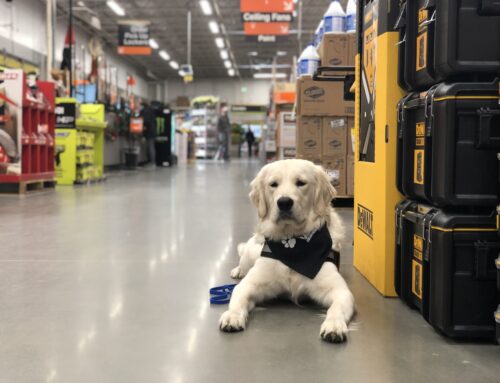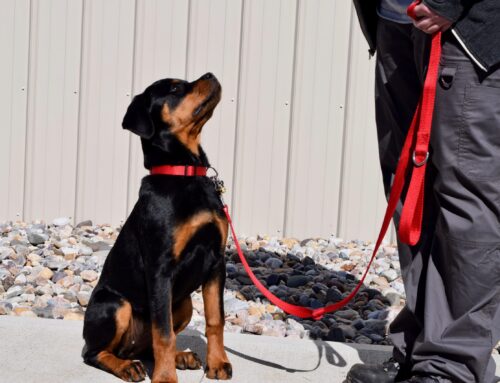One of the most frequently asked questions we get is, “How do I find a good breeder?” Deciding on a breed is hard. Finding a good breeder, even harder. Good breeders pay special attention to health, temperament, orthopedics, working abilities and more. They are passionate about what they do, and they want nothing more than to better their beloved breed and find amazing homes for the puppies they bring into this world.
So the question is: “What makes a good breeder a good breeder, and how do I find them?”
Most people know what breed of dog they want, but they get overwhelmed with the abundance of breeders available. In my search for a well-bred German Shepherd puppy, I did a lot of research on breeders and learned a lot about the role genetics play in health, temperament and overall structure. I found the world of breeding to be both fascinating and overwhelming at the same time.
I am not a breeder, but I have researched extensively and can help point you in the right direction. Please keep in mind that while Valor K9 Academy does a lot to support rescues, we also support good breeders. We feel that choosing to adopt or purchase your next puppy or dog is a very personal decision, and we respect whichever decision someone makes.
Breeding is a science, it’s an art, and it takes dedication to quality and incalculable amounts of time and money to produce quality, well-bred pups. I truly believe that good breeders aren’t out to make a profit; they love their breed, they’re passionate about what they do, and they work hard to produce healthy dogs with good temperaments and/or working abilities.
Let’s get started. What you’ll need is a list of breeders and their websites. Using the information below, I’m going to help you narrow down the breeders into a few good options.
First things first, good breeders have a kennel name and a website. While not all websites are fancy and straightforward, they should include the following basic information: male dogs, female dogs, current and/or upcoming litters, health guarantees and contact information.
When reviewing a breeder, here’s what I look for (in order):
HEALTH TESTING
Instead of wasting time on the home page where many breeders woo readers with flashy words like “Champion Bloodlines” and “Health Tested” in large, bold font, the first thing I do is click on “Males.” From there, I look at the first male listed. Is he health tested? A good breeder screens for health related issues.
For a complete list of health tests according to breed, go to the AKC breeds website.
If in fact the dog is health tested, what are the results? For example, with the German Shepherd Dog (GSD) breed, I look for OFAs to find out if the dog has been screened for Hip and Elbow Dysplasia. There are GSD breeders out there who claim their dogs have been tested and will say something like “OFA GOOD” or “OFA EXCELLENT” when, in fact, their dog are not. Always cross-check health testing information. For OFA results, go to www.ofa.org and enter the dog’s registered name into the left-hand column where it says “Search OFA for health tested dogs.” PennHIP is another way to check hips, and in Germany dogs are evaluated by the SV ratings system for both hips and elbows (0/0 is ideal). All scores are valid but must be confirmed. Don’t just take the breeder’s word for it.
If the male is not health tested, move on. You don’t want a puppy from a breeder who doesn’t health test their dogs.
TITLES
If the male is health tested, the next thing to look for is titles. While titles are not necessary, the majority of good breeders title their dogs in something the breed is known for, such as protection sports, agility, lure coursing, conformation, rally etc. Show titles are great, and for many non-working breeds, conformation titles are very popular.
For working breeds, however, you should see a title that shows the dog possesses working abilities akin to its breed standard. In the German Shepherd, for example, titles from working dog sports like IPO/IGP/Schutzhund are commonplace.
PEDIGREE INFORMATION
Next, check out the pedigree. This is where a lot of people get lost, because pedigrees are long and confusing, and a lot of the time if you aren’t familiar with the breed, you don’t know what you’re looking for. Look for the two things mentioned above: Health testing and titles. Go at least three generations back and check for both. Cross-check health testing to confirm all claims.
Pedigrees are something to look at now and discuss later. A good breeder will be able to explain pedigrees and bloodlines and will know very specific things about each of the dogs in it for many generations back. Pedigrees provide a wealth of information. For example, knowing a puppy’s ancestors can sometimes be a good indicator in regards to expected health, temperament, conformation and/or working abilities.
Photo above: The sire of my German Shepherd (Havok) is listed above. The red and blue are both titles. The green is health testing (hips and elbows). SZ and AKC are registration numbers for Germany and the US.
After you check everything for the first male, check for health testing, titling and pedigree information for the female. If the female meets your criteria, check other dogs on the page. Sometimes, breeders have one or two quality dogs and lots of other subpar dogs. A good breeder only breeds the best of the best, oftentimes using outside dogs to improve lines, and would never consider breeding a dog with bad hips, no titles and unimpressive pedigrees. Many breeders will list prospective dogs – dogs who they’re raising in hopes of someday breeding – if these dogs don’t have health testing done, titles etc, chances are it’s because they’re too young. It doesn’t mean the breeder is using the dog in their breeding program, it’s just a prospect.
WARM, FUZZY STUFF
Finally, I look for pictures, videos, descriptions of the dogs and, of course, current and/or upcoming litter information. I read the About section to find out more about the breeder(s), their history with the breed, where they’re located etc. I look at social media, reviews and testimonials, updates – all the stuff that most people look at first. Most good breeders are hobby breeders who only have a few litters per year. But some good breeders do this for a living and produce many quality litters annually. All good breeders live with their dogs and treat them like family members. They readily post information, litter expectations, prices and more. Their puppy contract is usually available, they have a health guarantee on their puppies, and they list valid contact information (phone number, email address, PO box or home address etc).
WORTH MENTIONING
I feel it’s important to mention this, because it’s oftentimes overlooked, but there are a few more things to consider when narrowing down your list of choices:
1) Good breeders don’t charge more based on a puppy’s coloring.
2) Good breeders won’t let you take home a puppy until the puppy is at least 8 weeks of age.
3) Good breeders don’t breed non-standard colors such as blue Frenchies, silver Labs, panda Shepherds etc. Be sure to know what are acceptable breed colors for the breed you’ve selected, so you don’t accidentally land on a bad breeder.
4) Good breeders don’t meet you in a grocery store parking lot or a gas station. They welcome you into their home and introduce you to their dogs.
5) Good breeders usually pick out the best-fit puppy for you, or give you a few puppies to choose from, rather than letting you pick a puppy from the entire litter. They know their puppies like the back of their hand and know what you want. Let them pick your puppy for you.
NEXT STEP: CONTACT THE BREEDER
Once you’ve narrowed down the list of potential breeders, contact the breeder and ask all the questions you have. Some breeders, especially hobby breeders, may take a few days to respond. They have full-time jobs and do this as a hobby, so be patient in waiting for a response. Have a list of questions prepared ahead of time to ask the breeder and, if the breeder is in your area, find out if it’s possible to visit. (For a list of questions to ask breeders, click here.) A good breeder will always let you come visit their facility and/or home. In fact, many good breeders require a visit prior to letting you place a deposit.
A good breeder has just as many questions for you as you do for them. And remember, a good breeder is an expert in regards to their particular breed or breeds. They know exactly what types of dogs they produce, and they know what types of homes/families are a good fit for the dog.
If you think you’ve picked the right breed, but the breeder won’t allow you to purchase one of their puppies, get a second opinion from a different breeder and then take it from there. You may not have selected the appropriate breed in the first place, and a good breeder who’s invested countless time, money and dedication to their program simply will not let their puppies go to just anyone. Don’t take offense to it; that breeder just did you a favor and saved you from a lifetime of headaches, torn curtains and sleepless nights.
Think of it this way: A heart doctor is an expert in his particular field. You wouldn’t challenge his assessment, would you? Let breeders do their job and protect the breed they love.
I hope you find this blog post helpful. Together we can help end poor breeding practices by backyard breeders and pet stores and support the good-faith efforts of responsible, ethical breeders. A well-bred dog is a joy to own, raise and train.
For a list of recommended German Shepherd breeders, click here.
For a list of Golden Retriever breeders in the Boise area, click here.
For a list of recommended Service Dog breeders, click here.
For a list of questions to ask breeders, click here.
Thanks for reading!









Leave A Comment